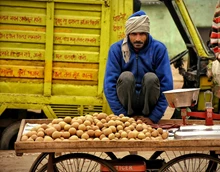
West Bengal’s largest labour intensive industries are Tea and Jute, with 60 operational jute mills in south Bengal directly employing around 200,000 people and 283 tea gardens in north Bengal employing about 350,000 permanent & casual workers.
The Ministry of Food and Public Distribution has urged the State Government on April 3 to instruct jute mills to immediately start operations so that other states did not run short of jute bags in the procurement season.
The decision was taken at a State Government meeting to review the lockdown and was conveyed to the jute industry in the evening. West Bengal has decided against allowing jute mills to start operations before the nationwide lockdown ends, heedless of requests to the effect by the Centre.
The Governments of Punjab and Telangana and the Food Corporation of India had written to the Union government that a shortage of jute sacks may hit procurement of farmers’ produce and urged the Centre to request the State Government to allow jute mills to function.
The West Bengal Government also turned down the Centre’s request to let tea gardens resume operations before the lockdown announced by the Centre ends on April 14.
West Bengal Chief Secretary Rajiva Sinha of West Bengal opined that “We can’t let the mills operate on the basis of the letter from the food ministry. The lock down till April 14 was announced by the Home Ministry and the home ministry needs to tell us that jute mills have been exempted.”

The Labour Minister Malay Ghatak communicated the Government’s decision to the industry, Indian Jute Mills Association’s Director-General Debasish Roy sent a notice to the management of all jute mills, saying, “As per discussions held with Hon’ble Minister in Charge, labour, Government of West Bengal, all mills are advised to extend to lockdown till further orders are received from the Government.”
On April 3, E K Majhi, Additional Secretary at the Ministry of Consumer Affairs, Food and Public Distribution wrote to the West Bengal Chief Secretary that the Government of Punjab and the FCI had attributed the shortage of jute sacks to the non-functioning of Bengal’s jute mills since the beginning of the three-week lockdown in March and that, compounding the situation, the country may require more bags this year.
“It is of utmost importance that jute mills immediately resume their operations for manufacturing/dispatch of jute bales to meet the requirements of the State Procurement Agencies/FCI,” Majhi wrote.
“I shall, therefore, earnestly request your indulgence to direct jute mills to immediately start manufacturing/ supply of jute bales so that during the peak procurement period, procurement operations of government are not disrupted due to a shortage of jute bags,” the letter said.
On April 3, the Centre had also exempted tea gardens from the lockdown and allowed plantations with up to 50 percent of the workforce to resume operations.
Chief Minister Mamata Banerjee said “Centre told us to let tea gardens operate but I have spoken to people involved in the industry and they were all of the opinion that the lockdown should continue. Also, the workers are scared and unwilling to join. Above all, we need to be cautious because the region that is home to the gardens has international borders with Nepal and Bhutan and state borders with Assam and Sikkim. I can’t take the risk of letting the gardens operate.”










